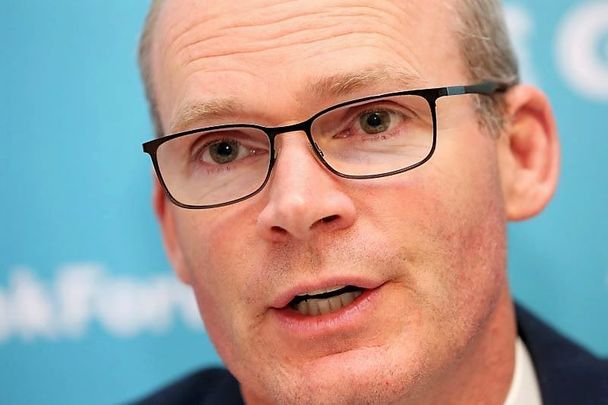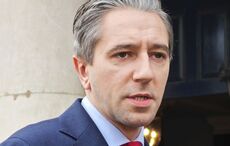Ireland’s Minister for Foreign Affairs Simon Coveney made a two-day visit to New York City this week for both bilateral and UN Security Council events.
On Tuesday, after engagements at the UN, Coveney participated in a roundtable discussion with Irish American representatives at the Irish Consulate on Park Ave.
“It never ceases to both impress and amaze me the strength of connection that remains here in the US with Ireland, with Irish people, and with Irish communities across the US," Coveney said.
Accompanied by Fergal Mythen and Joe Hackett from Ireland's Department of Foreign Affairs, Coveney gave an update on the Irish government’s perspective on an array of issues, with a particular focus on legacy issues stemming from the Troubles.
"We’re in a complex space," the Minister said during his opening remarks. “In some ways, Ukraine, and what’s happening there, is disguising to a certain extent the extent of challenge and difficulty and political complexity in Northern Ireland, but it hasn’t gone away and it’s not going to go away."
At the forefront of this "political complexity" is the British government's proposal for a statute of limitations for atrocities and crimes committed during the Troubles.
“Our view on this has been we cannot and will not support an amnesty or a statute of limitations," Coveney said on Tuesday, adding that he is not aware of any organization, political party, or victims group that supports that approach.
In the US, dozens of bipartisan congresspeople signed a letter to UK Prime Minister Boris Johnson condemning the amnesty plans, while an official congressional resolution is in the works.
When asked, Coveney said that he does expect Taoiseach Micheál Martin to discuss legacy issues when he travels to Washington, DC next week for St. Patrick's Day.
Coveney, who noted that there is a lot of support on legacy issues in Washington, added: “I think President Biden is also interested in this issue. He’s shown a willingness to speak up on the peace process.
"I think he sees himself as a guarantor of the peace process in Ireland and legacy is a very emotive part of that.”
During the discussion, a question was raised about what Irish Americans can do to keep the agreements on course.
"Don't underestimate the Irish lobby in Washington," Coveney said, "it's still pretty strong, I think you'll see that next week.
"If you look at this administration in the White House, the President himself is probably the most Irish American president in terms of wearing his identity on his sleeve that we've seen maybe ever, actually, including Kennedy and others.
"And the people around him - people like Samantha Power, people like Jake Sullivan - who are literally at the end of the phone any time we look to talk to them.
"It's incredible the access the Irish government gets, and you'll see that next week."
He continued: "On the Friends of Ireland [Caucus], I'd like to see some more Republicans on that group if we could because it's really important that we don't allow Irish America to become the sort of the domain of the Democratic Party because the strength of Irish America has always been that it's been bipartisan.
"While there are some very strong Republican advocates for Irish issues, I think we need to work on that for us."
Coveney did acknowledge that Kevin McCarthy, the Senate Minority leader, "has always been very open to meetings whenever I'm in Washington and he's very influential." He further acknowledged that the previous administration was always open to talks with the Taoiseach.
"I think that is important that we think about how we can ensure that the voice of Irish America is in both parties," he added.
Coveney went on to say that it's important to continue asking prominent Irish Americans in Washington what's being done to protect the Irish peace process. He said that the Irish government is always willing to provide more information or brief them.
Coveney then began to discuss the future of Irish American and how the Irish government is working on preserving it: "We're looking for ways in which we can try to attract a new generation of Irish America into advocating for who they are and where they come from and take an interest in Irish politics because I think that's a really important task.
"For you, I would say, can we introduce our children into this space so that there is as strong an Irish lobby not only in Washington, but in a dozen cities across the US, in ten years' time as there was ten years ago.
"That's something we're putting a lot of thought into at the moment in terms of how we can invest more in Irish America and connections."
Coveney said the Irish government plans to extend voting rights to Irish citizens in the US and around the world in Irish presidential elections. He envisions this as a way to "keep people involved in what's happening in Irish politics and to give them a say in who's representing those interests back at home."
He continued: "I think, for now, there's no shortage of issues, unfortunately, and we have this extraordinary opportunity of an Irishman in the White House and we should use that for the next two years.
"We happen to have a very strong Irish American in the White House at a time when we have a very challenging British government."
Later, as he was preparing to leave to catch a flight back home to Ireland, Coveney thanked the group for its various avenues of work "to protect and maintain and develop Irish America and its connections with Ireland.
"It really is appreciated."




Comments